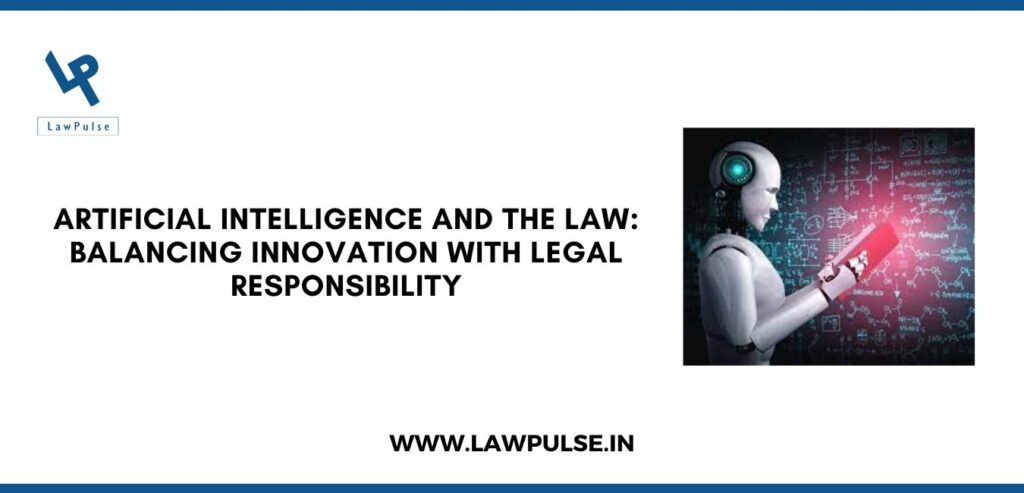ARTIFICIAL INTELLIGENCE AND THE LAW: BALANCING INNOVATION WITH LEGAL RESPONSIBILITY
Akshat Khandelwal
April 26, 2023
Blogs

Introduction:
Artificial Intelligence (AI) is a rapidly growing field that is transforming many aspects of modern life, including the legal industry. With the increasing use of AI in legal research, contract review, and document analysis, there is a growing need to understand the legal implications of AI. This article will explore the legal issues surrounding AI and its impact on the legal industry, as well as recent developments and propositions.
Background:
AI refers to the use of algorithms and machine learning to analyze data and make decisions without human intervention. In the legal industry, AI is being used for tasks such as legal research, contract review, and document analysis. AI can analyze large amounts of data and identify patterns and trends that humans might miss. This can lead to faster and more accurate legal analysis, which can save time and reduce costs.
Legal Issues:
While AI has many benefits, it also raises legal issues. One of the most significant concerns is the potential for bias in AI decision-making. AI algorithms are only as objective as the data they are trained on. If the data used to train an AI algorithm is biased, the algorithm will produce biased results. This can lead to discrimination and unfairness in legal decision-making. Another legal issue related to AI is the question of legal responsibility. If an AI algorithm makes a decision that causes harm, who is responsible? The programmer who wrote the algorithm? The company that deployed it? The user who relied on the AI algorithm? These questions are not easy to answer, and there is a need for legal frameworks to address them
Recent Developments and Propositions:
To address the legal issues surrounding AI, there have been recent developments and propositions. One of the most significant developments is the General Data Protection Regulation (GDPR) in the European Union. The GDPR regulates the use of personal data, including data used by AI algorithms. It requires companies to be transparent about their use of personal data and to obtain consent from individuals before using their data for AI purposes.
Another proposition is the use of explainable AI. Explainable AI refers to AI algorithms that can explain how they arrived at a decision. This can increase transparency and accountability in AI decision-making and help to address concerns about bias.
There have also been propositions for legal frameworks to address the responsibility for AI decision-making. One such framework is the concept of “algorithmic accountability.” This concept holds companies responsible for the outcomes of their AI algorithms and requires them to be transparent about their use of data and algorithms.
Examples:
There have been several examples of the legal implications of AI. In one case, an AI algorithm used in the criminal justice system was found to be biased against African American defendants. This led to calls for the algorithm to be removed from use.
In another case, an AI algorithm used in the recruitment process was found to be biased against women. The company that deployed the algorithm faced legal action for discrimination.
More recently, in 2021, a group of legal professionals in the United States released a report on the use of AI in the legal industry. The report noted that while AI has the potential to improve legal services, there are significant risks and challenges associated with its use. These include the risk of bias, the need for explainability and transparency, and the legal responsibility for AI outcomes.

Impact on the Legal Industry:
The impact of AI on the legal industry is significant and far-reaching. AI is already being used in legal research, contract review, and document analysis, and it has the potential to transform other areas of legal practice, such as litigation and dispute resolution.
One potential benefit of AI in the legal industry is increased efficiency. AI can process large amounts of data quickly and accurately, which can save time andreduce costs for legal firms. This can also lead to increased access to justice, as AI can make legal services more affordable and accessible to a wider range of people.
However, the use of AI in the legal industry also raises concerns about the impact on jobs. As AI algorithms can perform tasks traditionally done by humans, there is a risk that AI will replace human workers in the legal industry. This could lead to job losses and a shift in the skills required for legal work.
Another important issue to consider is the ethical implications of AI in the legal industry. AI has the potential to make legal decision-making more efficient and objective, but it also raises ethical concerns about the role of humans in legal practice. For example, if an AI algorithm can perform legal analysis faster and more accurately than a human lawyer, what is the role of the lawyer in the legal process? This raises questions about the value of human judgment and the importance of human input in legal decision-making.
Additionally, the use of AI in the legal industry requires careful consideration of privacy and security concerns. As AI algorithms rely on large amounts of data, there is a risk of data breaches and privacy violations. Legal firms must ensure that they have robust data protection policies in place to protect the sensitive information they handle. They must also consider the potential for cyber-attacks and ensure that their systems are secure.
Conclusion:
AI is a rapidly growing field with significant potential to transform the legal industry. However, the legal implications of AI must be carefully considered and addressed. Legal frameworks are needed to address issues such as bias and legal responsibility for AI outcomes. The use of explainable AI can increase transparency and accountability in AI decision-making, and the GDPR can regulate the use of personal data in AI algorithms. As the legal industry continues to adopt AI, it will be important to balance innovation with legal responsibility and to ensure that AI is used in a way that benefits society as a whole.
About the Author:
Komal Mathur is currently in her 3rd year pursuing B.A. LL.B (Hons.) from Manipal University, Jaipur.
Recent Post
-
 04 Apr 2024National Trial Advocacy Competition by Amity University Rajasthan | April 25th – 26th, 2024 [Register by April 9, 2024]
04 Apr 2024National Trial Advocacy Competition by Amity University Rajasthan | April 25th – 26th, 2024 [Register by April 9, 2024] -
 13 Feb 2024Understanding India's Minimum Support Price (MSP) System
13 Feb 2024Understanding India's Minimum Support Price (MSP) System -
 07 Feb 2024CFP: ODR POLICY SUMMIT 2024 ORGANISED BY SGT UNIVERSITY, GURUGRAM: [HYBRID, MARCH 16TH ] [REGISTER BY 15TH FEB, 2024]
07 Feb 2024CFP: ODR POLICY SUMMIT 2024 ORGANISED BY SGT UNIVERSITY, GURUGRAM: [HYBRID, MARCH 16TH ] [REGISTER BY 15TH FEB, 2024]
Get Notified Every Time We Post An New Episode
Other Pages
Copyright © Law Pulse 2023. All rights reserved.



